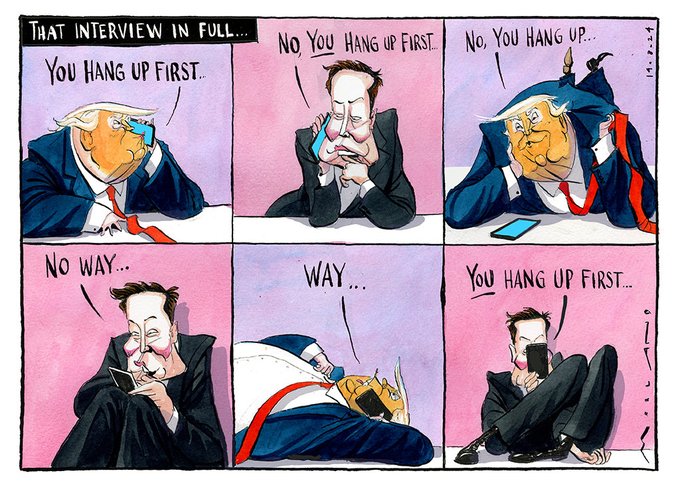Quote:
Originally Posted by bitontheslide

Nancy was in her 80's and house speaker, McConnell, well I don't need to say any more. Having Biden and Trump at the top of the ticket was just asking too much of the public. Thats why Harris is popular, she isn't a geriatric and like it or not, the majority of young people will vote for her.
However, anyone that thinks this is all going to resolve itself in november is kidding themselves. One way or another there will be serious unrest, the scale of it all is the only thing in doubt. If Trump goes ahead with his threat to deport millions, does he really think thats all going to happen peacefully?
|
The public voted those two to top of the ticket and voting numbers are lower than average across the board. Harris was not nominated by a public vote, so I think her popularity is being portrayed as something we didn't even bother to put forward for a public vote.
Some want to see Trump gone by any means, which is fair, and this is their only chance to do so, likely permanently (can't see a 2028 run). However, the US is not like 2016 or even 2020 anymore where the average person is that intimately involved with their own politics. The political messaging out in the wild has vastly reduced as well.
I see a real possibility that the federal govt continues to weaken as more people lose faith in Congress that we see States step up more to fill in the gaps. That's not going to end in an Civil War or anything like that so easily (not what you said, but it's been put out there).
Yes, there will be unrest as the govt continues to force weak policy at the federal level. Nobody finds how things are being run remotely "agreeable"

but more often I hear people say "This state has that problem" versus "The whole govt has this problem". People closely identify with the State they occupy more than the national side. There's some policies, yes, that are decided nationally but much of the power is shared with the States in the US. Even with polarization, people can still see the issues that are isolated to them, and separate from systemic issues local to where other things may be coming from. There's entire channels dedicated to simply problems that one finds in places such as Seattle, Baltimore, California and the like and the argument isn't "Federal could fix this!"... it's "those states have serious issues and
they need to fix this".
I still contend the uneasy relationship between the People and the federal govt is not only critical, but intended by the Founders, as we are meant to be skeptical enough at all times to hold the national govt accountable. State power is meant to balance this out where federal govt falls critically short and it's how our system has been designed to function in the first place. Some people may not find that "preferable", but it's the wisest solution we've found to keep a growing population and differing interests across the entire country willing to share a common national interest. We are already seeing States push back with the laws being passed from every point of the spectrum, especially here in Texas, but I think that's a natural consequence of the national govt ignoring the Will of the People and then the States having to step in to make sure their voices actually are heard. The federal govt would have to do something truly grievous for it to rise to the next level, and so far it's just bad policy/politics. Congress often fails at passing even basic legislation. And even if they pass "bad" policy, a good portion of it (usually) can still be pushed back on by the voter at the individual State level.
As for deportation, that still has to happen at the State level. States have and can refuse to enact those orders and it could easily stop there. Perhaps they introduce a lengthy process to make it costly and painful. The federal government's power are often overstated on these boards. No matter who is in power, the President can't simply go into States and force anyone to enact "his or her" laws. Recent Presidents have really tried to change this, but State govts and the Judicial Branch have pushed back each time to keep them in check. This is not unique to Trump. Congress is more often than not gridlocked and so there's increasing pressure to treat the Presidential role as a pulpit rather than acting as a facilitator between the Federal Govt and the people's elected representation. Most often by people who don't understand how the system was designed in the first place.
































 Linear Mode
Linear Mode

